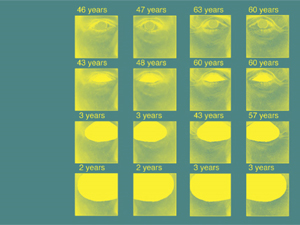



Date:29/11/18
 Scientists have developed a deep learned photographic biomarker in an effort to help identify human age.
Scientists have developed a deep learned photographic biomarker in an effort to help identify human age.
Estonian computer vision and AI startup company, Haut.AI, in partnership with Insilico Medicine, which uses genomics and data analysis to discover age-related diseases, conducted the research to advance the accuracy of predicting age.
The PhotoAgeClock predictor was trained on 8,414 anonymised high-resolution eye corner photos - which was found to be the most age-relevant area - with an accuracy level of 2.3 mean average error.
CEO of Haut.AI Anastasia Georgievskaya said: “Development of reliable biomarkers of ageing based on photographic images of the skin and face has the potential to accelerate ageing research and help identify interventions that improve skin health and beauty on an individual level.
“The study of multiple skin conditions using AI and computer vision may change the very approach to skin care.
“The main value of PhotoAgeClock and the non-invasive biomarkers trained on skin imaging data is in estimation of the differential changes induced by the various interventions.”
The researchers hope these ageing biomarkers can be used to provide early detection for diseases or prevent their onset.
This could also help the development of biomedical interventions and skin care treatments for the individual to offer a more personalised experience.
Scientists develop photographic biomarker to accurately identify age
 Scientists have developed a deep learned photographic biomarker in an effort to help identify human age.
Scientists have developed a deep learned photographic biomarker in an effort to help identify human age.Estonian computer vision and AI startup company, Haut.AI, in partnership with Insilico Medicine, which uses genomics and data analysis to discover age-related diseases, conducted the research to advance the accuracy of predicting age.
The PhotoAgeClock predictor was trained on 8,414 anonymised high-resolution eye corner photos - which was found to be the most age-relevant area - with an accuracy level of 2.3 mean average error.
CEO of Haut.AI Anastasia Georgievskaya said: “Development of reliable biomarkers of ageing based on photographic images of the skin and face has the potential to accelerate ageing research and help identify interventions that improve skin health and beauty on an individual level.
“The study of multiple skin conditions using AI and computer vision may change the very approach to skin care.
“The main value of PhotoAgeClock and the non-invasive biomarkers trained on skin imaging data is in estimation of the differential changes induced by the various interventions.”
The researchers hope these ageing biomarkers can be used to provide early detection for diseases or prevent their onset.
This could also help the development of biomedical interventions and skin care treatments for the individual to offer a more personalised experience.
Views: 408
©ictnews.az. All rights reserved.Similar news
- Azerbaijani project to monitor disease via mobile phones
- Innovative educational system to be improved under presidential decree
- NTRC prolongs license of two TV and radio organizations for 6 years
- Azerbaijan establishes e-registry for medicines
- Azerbaijani museum introduces e-guide
- Nar Mobile opens “Nar Dunyasi” sales and service center in Siyazan city
- International conference on custom electronic services held in Baku
- OIC secretary general to attend COMSTECH meeting in Baku
- Azerbaijan develops earthquake warning system
- New law to regulate transition to digital broadcasting in Azerbaijan
- Azerbaijani State Social Protection Fund introduces electronic digital signature
- Intellectual traffic management system in Baku to be commissioned in December
- Tax Ministry of Azerbaijan started receiving video-addresses
- World Bank recommends Azerbaijan to speed up e-service introduction in real estate
- Azerbaijan to shift to electronic registration of real estate





















